Tag: Region 5
Health professions programs bridge community and career


Kay Gardner spent three decades at the Pocatello Children’s Clinic, taking on various roles in billing, collections and reception. Though she loved working in healthcare, she knew she didn’t want to remain in clerical work until retirement. What she didn’t know was that her husband, Mike, would be the key to helping her discover her calling.
“Mike was a paramedic who often taught night classes at local colleges, so he was gone all the time. I said, ‘You know, I really don’t like staying home alone, so I’m going to take an emergency medical technician (EMT) class so I can teach with you,’” Gardner recalled. “I took the class, and as part of it, you get to run on the ambulance, and it just stirred my soul.”
After taking the EMT class, Gardner continued her work at the clinic and served in the reserves at the Blackfoot Fire Department. In 2019, an opportunity aligned her career with her newfound passion. When her husband retired, an acquaintance contacted him about taking over her EMT class at Idaho Falls School District No. 91’s Career and Technical Education Center. Eager for a new direction, Gardner jumped at the chance.
“I suggested I take the position and haven’t looked back,” said Gardner.
Gardner used her experience and connections as an EMT to reimagine the year-long program, which includes dual credit through CSI. Classes run for two hours a day, four days a week. The extensive curriculum incorporates allied health, medical terminology and optional modules such as blood glucose monitoring and IV training. The CMA program is also a year-long program. Although students are technically supposed to receive an hour of CMA instruction each day, there’s considerable overlap between the programs.
I took the class, and as part of it, you get to run on the ambulance, and it just stirred my soul.
Kay Gardner, CMA and EMT instructor
“EMTs and CMAs both need to know medical terminology and allied health. They all earn their Assist with Medications, CPR, OSHA and Stop the Bleed Certifications. I just figure the more they know the better prepared they are for the world,” said Gardner. “In addition to clinical skills, CMAs also need to have clerical skills, so that’s the main difference.”
Gardner’s connections have led to a strong technical advisory committee (TAC) that supports her programs by donating equipment and providing guidance on skills and equipment students need. In addition to providing internships and hands-on experience, TAC members also volunteer in the classroom.
“I can’t do skills training with this many kids and have them be safe, so I have people who do this for a job come in to help teach and test,” Gardner explains. “Bonneville County Fire members were here practically as much as I was last year.”
This collaborative effort fosters a sense of community among the emergency medical services (EMS) in Southeast Idaho, with active participation from Central Fire Department in Rigby, Bonneville County Fire District in Idaho Falls, Idaho Falls Fire Department and Ammon Fire Department.
Upon completion of the program, students are prepared to take the National Registry of Emergency Medical Technicians exam.
“Some of my students go straight into industry as EMTs, and most of them go on to do fire services as well,” said Gardner. “I try to make sure that even if EMS isn’t their pathway, they learn something that will help them in their career.”
SkillStack® enhances law enforcement education at Idaho State University
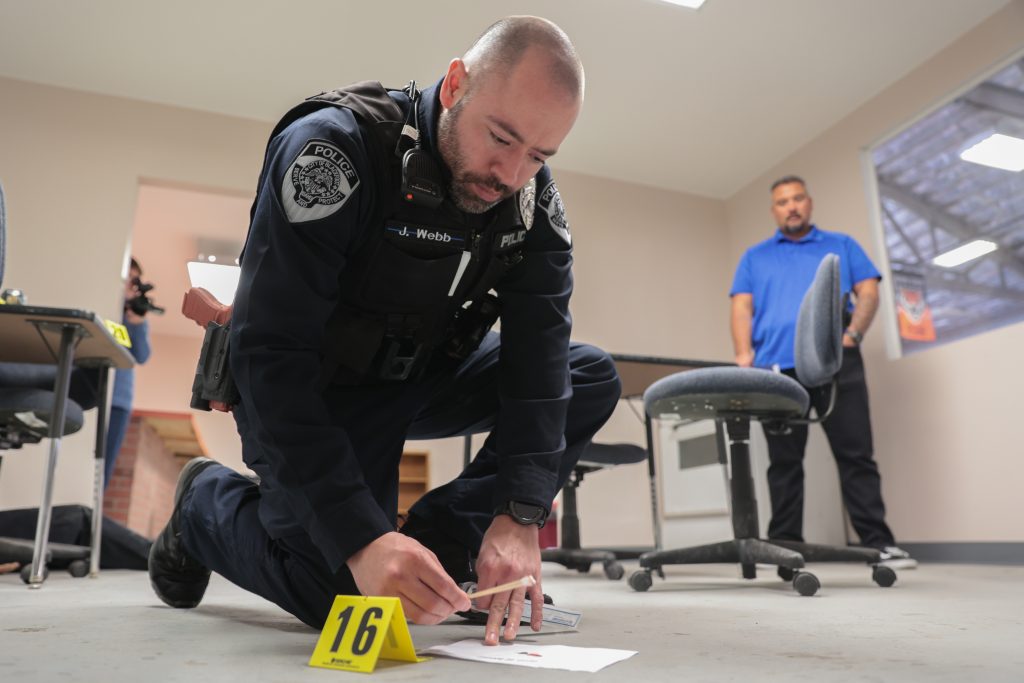
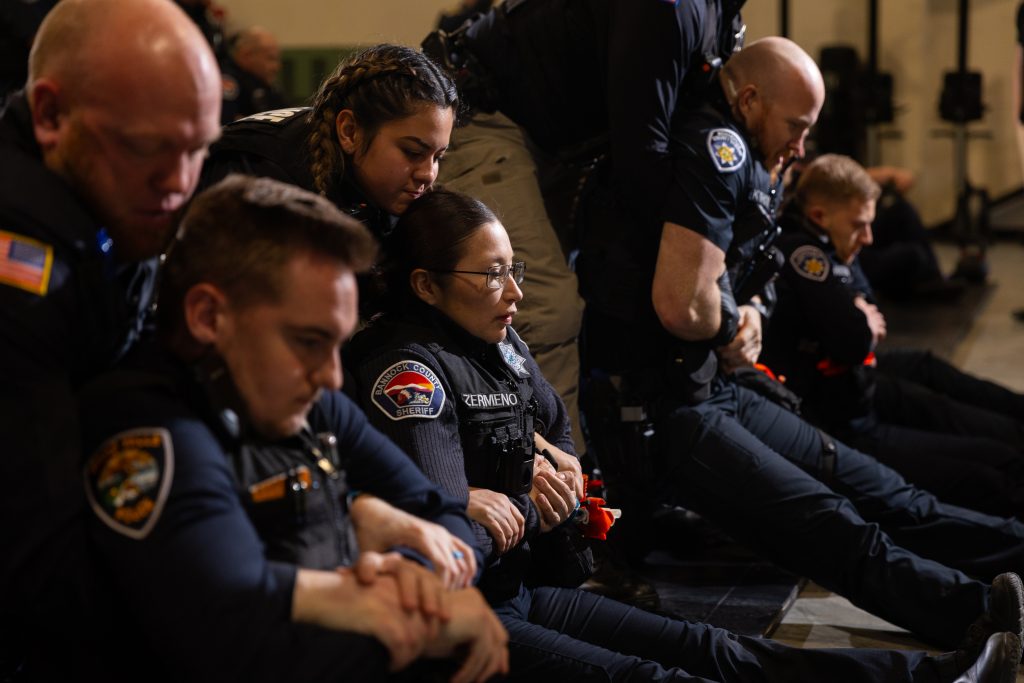
Historically, the Idaho State University (ISU) Law Enforcement Program attracted only three to four students each semester who enrolled at ISU without prior connections to law enforcement agencies. Instead, most of the law enforcement participants had already been hired by a local law enforcement agency but needed to complete their Peace Officer Standards and Training (POST) to continue working, with their agencies covering the costs of their coursework through the WTC. Because of this enrollment process, these students weren’t enrolled as degree-seeking students, so they couldn’t receive ISU credit toward a certificate for their efforts.
To earn a degree, which benefits career advancement, these students previously had to navigate an extensive prior learning assessment process. However, this approach saw little success, with very few applications submitted over the program’s history. The program aimed to find a more effective way to recognize students’ accomplishments while satisfying the requirements for a Basic Technical Certificate (BTC).
The IDCTE SkillStack® microcredentialing program offered a unique solution to this challenge.
I can use the college credits I earned while [I also] obtain my Idaho POST Certification.
Benjamin Avolio, ISU Law Enforcement student
ISU faculty contacted IDCTE to discuss converting existing coursework into a series of stacked badges. After the university provost, registrar and College of Technology dean granted provisional approval for the process to begin as a pilot, the IDCTE team aligned the badges with the law enforcement curriculum, demonstrating how the activities associated with the badges matched the courses’ learning outcomes. A key challenge was ensuring that students could enroll without incurring extra costs. To address this, the ISU team created a zero-credit course, allowing students to pay an application fee to ISU. After completing the coursework, instructors log achievements in SkillStack® and send a memo of completion to the university registrar to award academic credit. This streamlined process integrated practical training with academic recognition, enabling students to apply for graduation.
“SkillStack® is a neat program. I can use the college credits I earned while [I also] obtain my Idaho POST Certification,” said Benjamin Avolio, a current ISU Law Enforcement student.
Since implementing SkillStack®, the number of BTC recipients in the law enforcement program increased dramatically, from 15 over five years to 38 in the first year. More importantly, law enforcement agencies have expressed strong support for the program, encouraging their officers to participate to enhance career prospects.
By sharing this successful model, ISU aims to improve law enforcement training across Idaho and foster cooperation among educational institutions, with the College of Western Idaho and CSI expressing interest in adopting SkillStack® for their programs. Overall, the SkillStack® microcredentialing program at ISU represents a significant shift in law enforcement education, enhancing the educational experience for students and contributing to more effective training in the state. This innovative approach sets a precedent for similar initiatives in other programs and institutions.
Medical assisting program helps fill growing demand for healthcare professionals
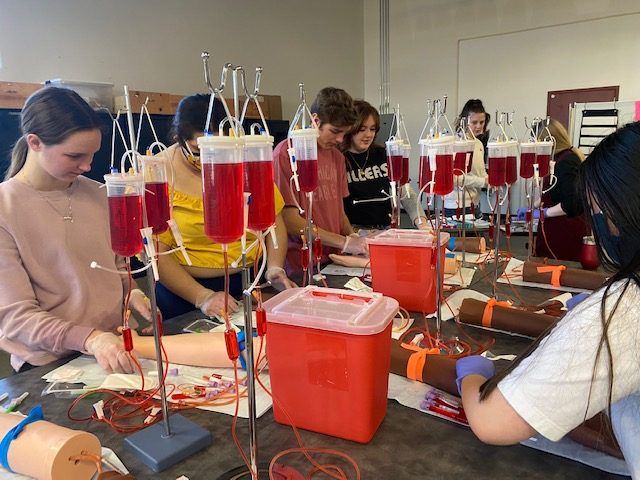
In 2019, School District 25 Career Technical Administrator for Pocatello’s Gateway Professional Technical Education program Rhonda Naftz recognized that many students interested in health professions didn’t want to pursue a career in nursing. Naftz researched potential programs to meet her students’ interests. She discovered that medical assistants (MA) do many routine administrative and clinical functions, creating additional time for doctors and nurses to care for their patients. The labor market data showed and still reports a dire need for health professionals nationwide, resulting in high demand for Medical Assistants in hospitals, clinics, and doctor offices.
Naftz approached the Division about piloting the state’s first secondary MA program. Naftz knew the program needed an instructor with both practical and classroom experience to succeed. She found that instructor in Kristina Pasquella. A graduate from Idaho State University’s MA program, Pasquella was working full-time in a local medical facility and also adjunct faculty in the ISU MA program.
“Our program creates an amazing pipeline into medical assisting or other healthcare classes.”
Kristina Pasquella
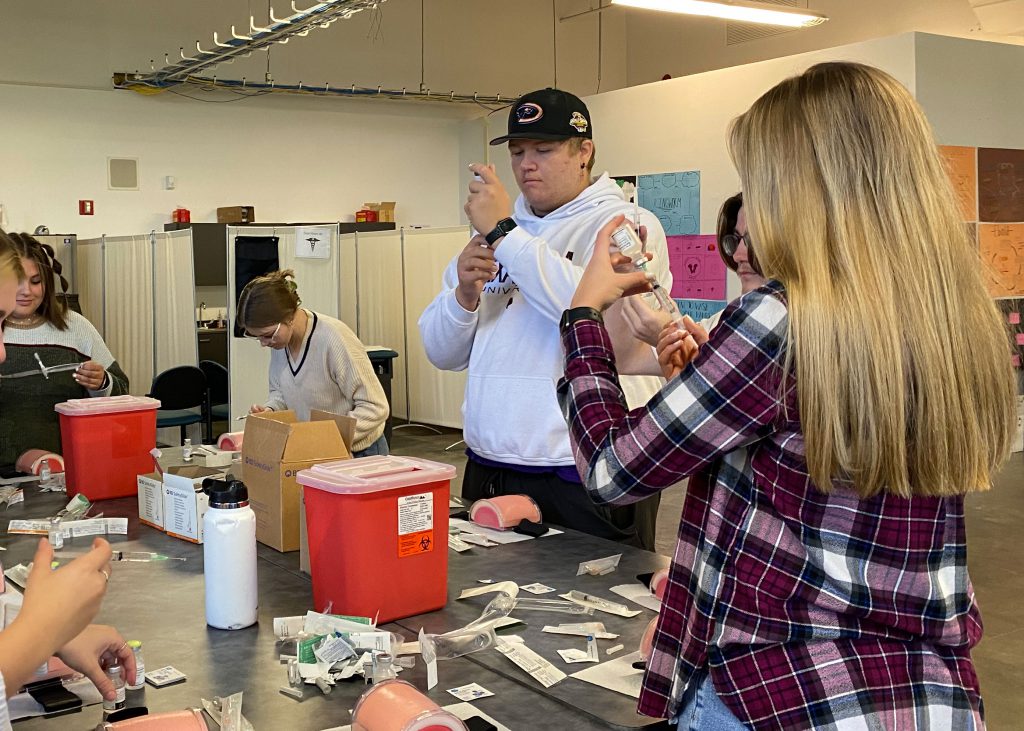
“I’d piloted quite a few education programs for mental health and healthy living programs in the past. As a kid, I always wanted to be a teacher, so creating the pilot program was really interesting and appealed to me,” said Pasquella.
Given Pasquella’s decade of experience as an MA, she worked with ISU and the State CTE Division to design a program giving students the real-world experiences they’d need to be successful. Her classroom looks like an actual medical clinic, complete with exam rooms and a waiting room stocked with posters and brochures created by her students. Students practice calling a patient from the waiting room, walking them to an exam room, taking vitals, asking questions, and recording the answers for the doctor to review. They also get to practice giving intradermal, intramuscular, and transdermal injections on an injection pad. One of their favorite activities is practicing drawing fake blood from realistic-looking silicone arms. Though students enjoy the clinical aspects of the program, they also learn clerical and administrative tasks like scheduling appointments, billing patients and insurance, and medical coding.

“Our program creates an amazing pipeline into medical assisting or other healthcare classes,” said Pasquella.
The partnership with ISU allows students to take to earn college credits for five of the six classes using Advanced Opportunities funds, meaning students pay nothing out of pocket, and their credits transfer seamlessly after graduation. About a quarter of the students who complete the program go right to work after graduation; others can go to CSI to earn a certificate or ISU to pursue a two-year degree.
Four years after its inception, 113 students have completed the program, with 43 more scheduled for this year. Interest in the program—from students and regional employers—continues to grow. Moving forward, Naftz says they’re planning on consolidating all the health profession programs into one building to better use resources and equipment and investigating adding a Certified Clinical Medical Assistant credential to the program.
“Medical programs are notoriously expensive to run, but there’s nothing like CTE to show real, tangible results and a direct correlation between investment and student success,” said Naftz. “We’re so grateful for the continued support of the Pocatello Chubbuck School District, the Division, and the legislature for this and all our CTE programs.”
 Official Government Website
Official Government Website